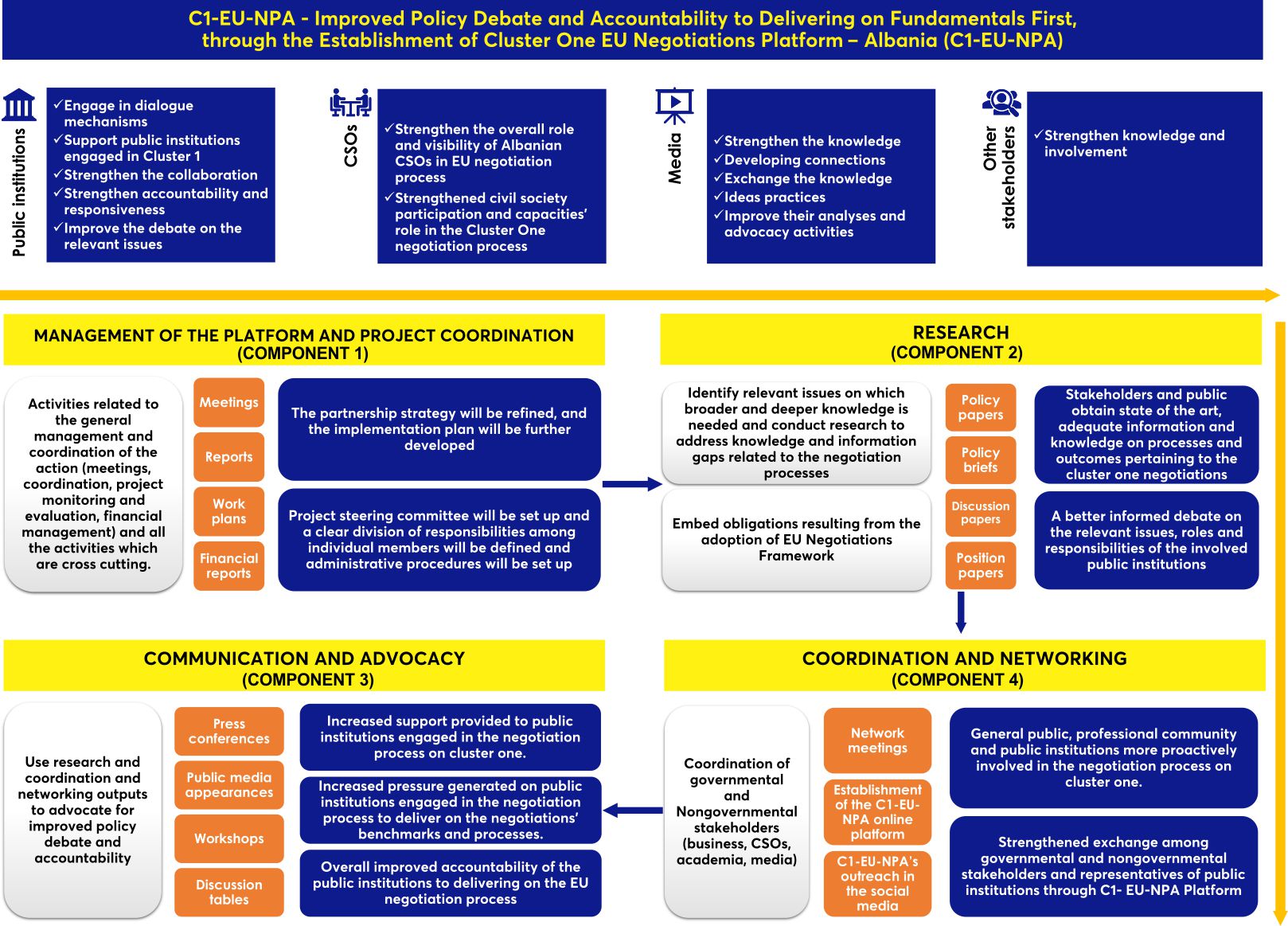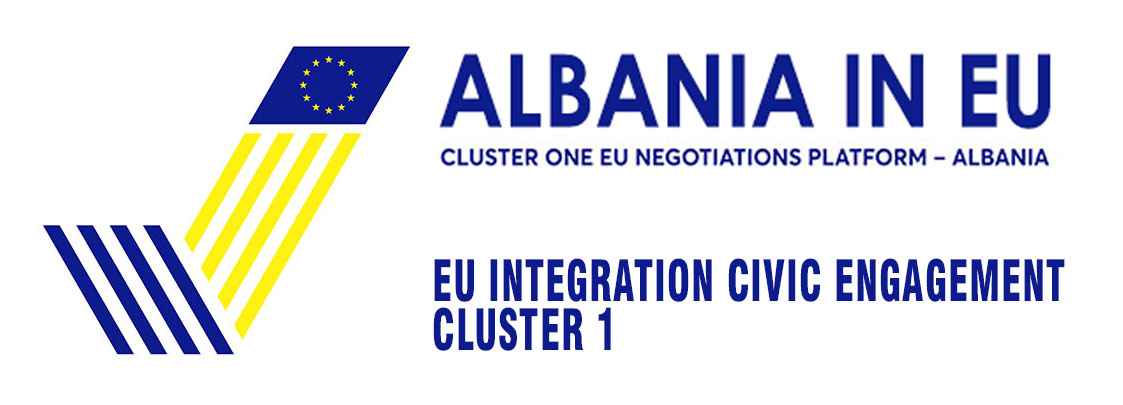About us
 Albania officially applied for EU membership in 2009 and has been an official candidate country since 2014. The country has made significant progress in its EU integration journey, but there is still much work to be done, especially in areas such as the rule of law, judiciary reform, corruption, organized crime, and human rights. In July 2022 EU accession negotiations started, and now Albania has to move towards full membership fulfilling all benchmarks in each cluster and chapter including the adoption of key reforms and the implementation of the necessary legislation and institutions.
Albania officially applied for EU membership in 2009 and has been an official candidate country since 2014. The country has made significant progress in its EU integration journey, but there is still much work to be done, especially in areas such as the rule of law, judiciary reform, corruption, organized crime, and human rights. In July 2022 EU accession negotiations started, and now Albania has to move towards full membership fulfilling all benchmarks in each cluster and chapter including the adoption of key reforms and the implementation of the necessary legislation and institutions.
In this context, the role of civil society is essential in ensuring that the EU integration process is transparent, inclusive, and accountable. CSOs are critical watchdogs, advocates, and service providers, working to promote human rights, democracy, and the rule of law, and to hold the government and other stakeholders accountable. CSOs also play a crucial role in fostering dialogue and cooperation between different actors and communities, promoting civic education and awareness, and supporting the social and economic development of the country.
Our webpage aims to provide information, analysis, and resources on the EU enlargement process of Albania, focused on Cluster 1 “Fundamentals First” and the role of civil society in this process. We will keep you updated on the latest developments, news, and events related to Albania’s EU integration, including the progress reports, the accession negotiations, and the implementation of the reform agenda. We will also showcase the work of Albanian CSOs, their projects, and initiatives, and highlight their contributions to the EU integration process.
Our webpage also serves as a platform for networking, exchange, and cooperation between different stakeholders interested in Albania’s EU integration, including CSOs, policymakers, experts, academics, and the general public. We encourage you to engage with us, share your views and experiences, and contribute to the debate and the dialogue on EU enlargement and civil society in Albania.
The general objective of the project is to support Albania’s EU accession negotiations related to Cluster One chapters (fundamentals first) through improved policy debate and strengthened accountability and CSOs role in the process.
The Fundamentals Cluster contains following chapters:
23 – Judiciary and fundamental rights,
24 – Justice, Freedom and Security,
5 – Public procurement,
18 – Statistics, and
32 – Financial control,
as well as economic criteria; functioning of democratic institutions, and public administration reform.
This Cluster will be opened first and closed last.

The specific objectives of the project are to:
Support the public institutions
Support the public institutions engaged in the Cluster One EU negotiations through provision of policy expertise and
Strengthen accountability and responsiveness
Strengthen accountability and responsiveness of the public institutions engaged in the EU negotiation process to deliver on the fundamentals first and the overall pace of
Strengthen knowledge and involvement
Strengthen knowledge and involvement of the professional community, relevant stakeholders and the public on processes and outcomes pertaining to Cluster One EU negotiations.
Strengthen the overall role and visibility
Strengthen the overall role and visibility of Albanian CSOs in EU negotiation
Background and rationale
-
- Despite the political relevance of the popular support for the process, the EU membership is above all a process that entails above all the preparation of the aspiring country to implement the EU acquis communautaire. Generally, this remains little known among the population and the different interest groups and stakeholders. As such, the EU integration process in Albania has been framed as highly technical and understandable only by experts on EU issues.
- So far, the main source of information for the public on the EU integration process have been the EU progress reports. However, these reports have usually had little echo on the public opinion and the reports’ results have not been used by the media or CSOs for advocating the public debate.
- The Albania media also has failed to follow up on promoting the debate about the country’s progress based on EU progress reports, except for certain aspects related to the political criteria such as the elections and more recently the justice sector reform. This has had adverse effects on the accountability process and rarely the relevant institutions and elected officials have been challenged in the public debate on the poor results delivered so far.
- During the decade from Albania’s application for EU candidate in 2009, until the European Council decision to open accession negotiations in March 2020, political statements and promises have not corresponded with their implementation. The pattern of failing to deliver or delivering little on the obligation and EU recommendations, has dragged Albania process of opening of the negotiations for so long.
- CSOs engagement on EU integration process has been important in Albania, but so far CSOs action in this regard has been fragmented and discontinued. The opening of the accession negotiations and the ensuing processes demand an increased focus and continuity of action, particularly with regard to ensuring accountability of political and public institutions which remains one of the weakest links.
- The EU negotiations are a demanding process which puts a lot of strain in the public institutions that will deliver on the implementation of agreed roadmaps and action plans and achievement of the benchmarks. For the new methodology to produce the results and ensure successful negotiations and reforms the process has to be matched with mobilizing appropriate capacities.
Background and rationale
- Increased knowledge and awareness on processes and outcomes pertaining to the cluster one negotiations of the relevant decision makers and stakeholders.
- A better-informed debate on the relevant issues, roles and responsibilities of the involved public institutions.
- A more proactively involved in the Cluster One negotiation process of the professional communities and public institutions.
- Strengthened accountability of the public institutions to delivering on the Cluster One negotiation process.
- Strengthened civil society participation and capacities’ role in the Cluster One negotiation process.
Target group
- Public institutions involved in the overall EU negotiation process and in the negotiations of the Cluster 1 Chapters
- Research community and academia
- Civil society organisations
- Media
Partners
- Albanian Helsinki Committee (AHC – https://ahc.org.al)
- Albanian Institute for Political Studies (ISP – https://isp.com.al)
- Albanian Institute of Science (AIS – http://ais.al/new/)
- Center for the Study of Democracy and Governance (CSDG – http://csdgalbania.org)

